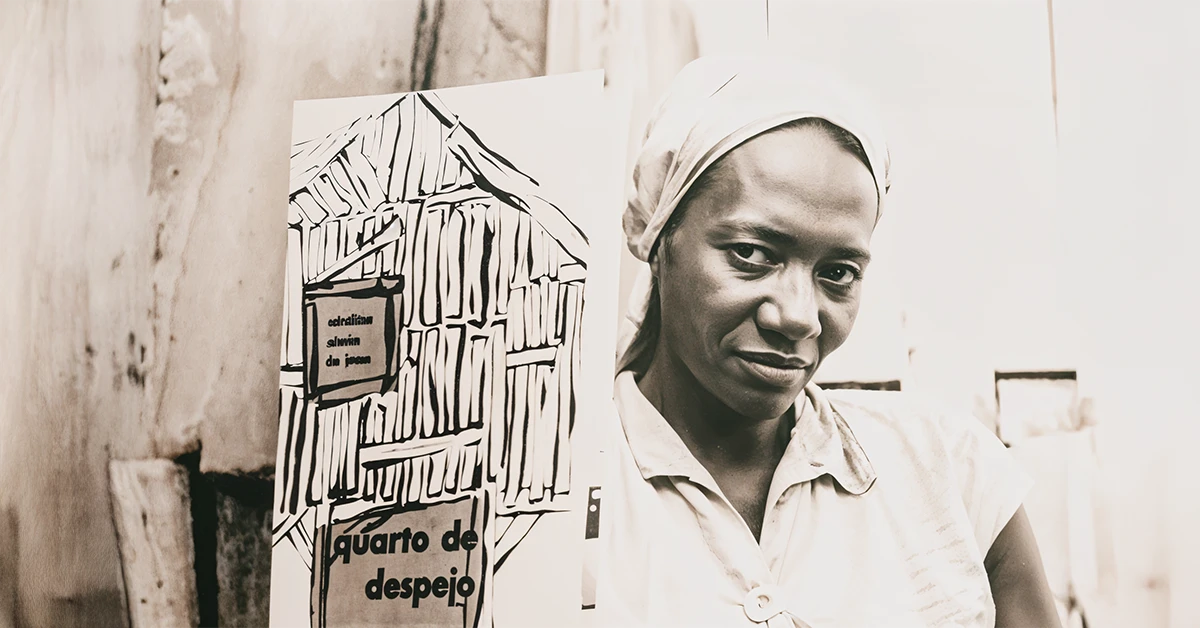In the vast landscape of Brazilian literature, few works offer as raw, unflinching, and vital a portrait of the nation’s social fabric as Quarto de Despejo book. More than just a literary piece, it is a historical document, a cry for justice, and a testament to the indomitable spirit of a woman who dared to write her truth from the margins of society. This book, known in English as Child of the Dark, is not merely a story; it is an essential window into the realities of poverty, race, and resilience in Brazil.
The Unlikely Author: Carolina Maria de Jesus
The story of the Quarto de Despejo book begins with its extraordinary author, Carolina Maria de Jesus. Born in 1914 in rural Minas Gerais, Carolina’s life was marked by hardship from the very beginning. Despite having only two years of formal schooling, she possessed an insatiable hunger for knowledge and a profound observational capacity. She moved to São Paulo in the 1940s, eventually settling in the Canindé favela, a sprawling shantytown on the outskirts of the bustling metropolis.
Carolina supported herself and her three children by collecting paper, scrap metal, and other discarded materials, earning a meager living as a catadora (paper collector). Yet, amidst the daily struggle for survival, she maintained a secret life: she wrote. In notebooks salvaged from the trash, she meticulously documented her daily experiences, her thoughts, her frustrations, and her dreams. These diaries were her sanctuary, her voice, and ultimately, her legacy.
Her discovery was almost accidental. In 1958, journalist Audálio Dantas was researching a story on the favela and stumbled upon Carolina’s notebooks. He was immediately struck by the raw power and authenticity of her prose. Recognizing its immense literary and social value, Dantas helped bring her work to publication.
A Diary from the Favela: The Heart of the Book
Published in 1960, Quarto de Despejo: Diário de uma Favelada (The Trash Room: Diary of a Favela Dweller) became an overnight sensation in Brazil. It quickly sold out its first print run and was subsequently translated into over 13 languages, introducing the world to the harsh realities of Brazilian favela literature through the eyes of someone living it.
The book is a collection of Carolina’s diary entries, spanning from 1955 to 1960. It offers an unfiltered, first-person account of life in the favela, detailing the constant struggle against hunger, the pervasive violence, the lack of sanitation, and the systemic neglect faced by its inhabitants. Carolina’s prose is direct, poignant, and often poetic, even when describing the most brutal aspects of her existence.
She writes about the perpetual search for food, the indignity of begging, the constant threat of eviction, and the complex relationships within the community. Her observations are sharp, revealing the hypocrisy and indifference of the outside world while also celebrating the resilience and humanity of her neighbors. The book’s power lies in its authenticity; it is a voice from the very bottom of the social hierarchy, speaking truth to power with an undeniable authority.
Themes: Poverty, Race, and Resilience
The Quarto de Despejo book explores several profound themes that remain highly relevant to understanding social inequality Brazil faces.
Poverty and Hunger: At its core, the book is a harrowing account of extreme poverty. Carolina’s entries are dominated by the relentless pursuit of food, the gnawing pain of hunger, and the desperation of trying to feed her children. She vividly describes the physical and psychological toll of living on the brink of starvation, where every day is a battle for survival.
Race and Marginalization: As a Black woman living in a favela, Carolina’s experiences are deeply intertwined with issues of race. She faces discrimination, prejudice, and the compounded challenges that come with being Black and poor in a society still grappling with the legacy of slavery. Her narrative is a crucial contribution to Black women’s writing Brazil, offering an invaluable perspective on the intersection of race, gender, and class. She highlights how the “trash room” is not just a physical space but a metaphor for the discarded lives of marginalized communities.
Motherhood and Resilience: Despite the overwhelming adversity, Carolina’s love for her children and her determination to provide for them shine through. Her resilience is a central theme, as she navigates a world designed to break her spirit, yet she persists, driven by hope and the desire for a better future for her family. Her commitment to writing, even when exhausted and hungry, is itself an act of profound resilience and intellectual defiance.
A Literary and Social Landmark
The impact of Quarto de Despejo was immediate and far-reaching. It forced Brazilian society to confront the uncomfortable truths about its urban poverty and the lives of its most vulnerable citizens. It challenged romanticized notions of favela life and provided a stark counter-narrative to official narratives of progress.
Beyond its social impact, the book is considered a landmark in Brazilian favela literature and a foundational text for understanding the experiences of marginalized voices. It paved the way for other authors from similar backgrounds and brought attention to the importance of diverse perspectives in literature. The Child of the Dark summary often highlights its unique position as both a personal diary and a powerful sociological document.
Carolina Maria de Jesus herself became a temporary celebrity, traveling and giving lectures. However, her fame was fleeting, and she eventually returned to a life of relative obscurity, struggling to maintain the financial stability that the book’s initial success had brought. Her story, in many ways, mirrored the very themes of the book: the difficulty of escaping the “trash room” even with extraordinary talent.
The International Impact
The global reach of Quarto de Despejo cannot be understated. When translated as Child of the Dark, it introduced international audiences to the harsh realities of Brazilian urban poverty. The book was particularly well-received in the United States and Europe, where it sparked discussions about poverty, racism, and social justice that transcended national boundaries.
The international success of the Quarto de Despejo book also highlighted the universal nature of Carolina’s struggles. While her story was distinctly Brazilian, the themes of poverty, discrimination, and the fight for dignity resonated with readers worldwide. This global recognition helped establish the book as not just a Brazilian classic, but as an important work of world literature.
A Voice That Refuses to Be Silenced
What makes Carolina Maria de Jesus’s work so powerful is not just what she wrote, but how she wrote it. Her prose is unadorned yet deeply moving, combining the immediacy of diary entries with the literary sophistication of a natural storyteller. She had an uncanny ability to find poetry in the midst of despair, to locate moments of beauty and humanity even in the most degrading circumstances.
Her writing style reflects her unique position as both insider and observer. She lived the experiences she described, yet she possessed the intellectual distance to analyze and critique the systems that oppressed her. This dual perspective gives her work a depth and authenticity that is rarely matched in literature about poverty and marginalization.
Contemporary Relevance
Decades after its publication, the Quarto de Despejo book remains profoundly relevant. The issues it addresses—poverty, social inequality Brazil faces, racism, and the struggle for dignity—continue to plague Brazil and many other parts of the world. Carolina Maria de Jesus‘s voice continues to resonate, reminding us of the human cost of neglect and the enduring power of personal testimony.
The book serves as a crucial historical document, preserving the experiences of a generation of Brazilians whose stories might otherwise have been lost. It also continues to inspire contemporary writers and activists, demonstrating the power of literature to effect social change and give voice to the voiceless.
Conclusion
Quarto de Despejo is more than just a book; it’s a cultural landmark, a powerful piece of Black women’s writing Brazil, and an indispensable contribution to Brazilian favela literature. It tells a story of hardship, resilience, and unwavering hope, reflecting the lives of millions who, despite immense challenges, refuse to be silenced.
For anyone seeking to understand the complexities of Brazil beyond the headlines, the Quarto de Despejo book is an indispensable read. It is a testament to the power of literature to shed light on uncomfortable truths, to give voice to the voiceless, and to inspire empathy and understanding. It is a book that demands to be read, reflected upon, and remembered.
Carolina Maria de Jesus’s legacy reminds us that great literature can emerge from the most unlikely places, and that the most important stories are often told by those society chooses to ignore. Her diary from the favela continues to challenge, inspire, and move readers around the world, proving that some voices, once heard, can never truly be silenced.
References
- The Stringuy:https://youtu.be/JXW05R7PNFE
- Carolina Maria de Jesus (Wikipedia): Carolina Maria de Jesus. https://en.wikipedia.org/wiki/Carolina_Maria_de_Jesus
- Quarto de Despejo (Wikipedia): Child of the Dark. https://en.wikipedia.org/wiki/Child_of_the_Dark
- The New York Times: A ‘Out of the Garbage Dump and Back Into the Human Race’. https://www.nytimes.com/1962/09/23/archives/out-of-the-garbage-dump-and-back-into-the-human-race.html
- The Guardian: A hunger for truth. https://www.theguardian.com/books/2005/feb/12/featuresreviews.guardianreview38





